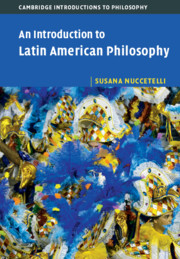Book contents
- An Introduction to Latin American Philosophy
- An Introduction to Latin American Philosophy
- Copyright page
- Dedication
- Contents
- Tables
- Preface
- 1 Setting the Scene: The Iberian Conquest
- 2 Modest and Immodest Feminism
- 3 The Authoritarian Republicanism of Bolívar
- 4 The Liberal Republicanism of Sarmiento and Alberdi
- 5 Homegrown and Imported Positivism
- 6 Martí’s Liberal Anti-Positivism
- 7 Utopian Latin Americanism: Arielism and Mestizofilia
- 8 Soft and Hard Socialism
- 9 Liberation Theology and Philosophy
- 10 Skepticism and Anti-Skepticism About Latin American Philosophy
- Glossary
- Bibliography
- Index of Names and Subjects
- References
4 - The Liberal Republicanism of Sarmiento and Alberdi
Published online by Cambridge University Press: 15 October 2020
- An Introduction to Latin American Philosophy
- An Introduction to Latin American Philosophy
- Copyright page
- Dedication
- Contents
- Tables
- Preface
- 1 Setting the Scene: The Iberian Conquest
- 2 Modest and Immodest Feminism
- 3 The Authoritarian Republicanism of Bolívar
- 4 The Liberal Republicanism of Sarmiento and Alberdi
- 5 Homegrown and Imported Positivism
- 6 Martí’s Liberal Anti-Positivism
- 7 Utopian Latin Americanism: Arielism and Mestizofilia
- 8 Soft and Hard Socialism
- 9 Liberation Theology and Philosophy
- 10 Skepticism and Anti-Skepticism About Latin American Philosophy
- Glossary
- Bibliography
- Index of Names and Subjects
- References
Summary
Chapter 4 considers a debate between two Argentine political thinkers of the period of national organization that followed the end of the wars of independence in Latin America: Domingo Faustino Sarmiento (1811-1888) and Juan Bautista Alberdi (1810-1884). Both of them endorsed liberal republicanism, a set of doctrines of moral and political philosophy that opposed Bolivarism and which was widely popular in the region during the post-independence period. The chapter demonstrates that Sarmiento and Alberdi had in common a general philosophical framework, even when they perceived their views as incompatible with each other's. Key shared doctrines included the infamous civilization/barbarism dichotomy and the no-less-infamous European-transplantation model of Latin American identity. This chapter argues that since Sarmiento and Alberdi had these substantive doctrines in common in matters concerning race and liberal democracy (judged to be the best form of polity for the new Latin American nations), their differences were almost trivial. Both of them disagreed with Bolívar, who acknowledged Latin America’s ethnic and racial diversity but remained skeptical about the suitability of liberal democracy in the region.
Keywords
- Type
- Chapter
- Information
- An Introduction to Latin American Philosophy , pp. 74 - 93Publisher: Cambridge University PressPrint publication year: 2020

